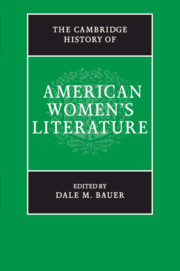Book contents
- Frontmatter
- Contents
- List of illustrations
- Acknowledgements
- Notes on contributors
- Introduction
- 1 The stories we tell: American Indian women's writing and the persistence of tradition
- 2 Women writers and war
- 3 American women's writing in the colonial period
- 4 Religion, sensibility, and sympathy
- 5 Women's writing of the Revolutionary era
- 6 Women writers and the early US novel
- 7 Women in literary culture during the long nineteenth century
- 8 Moral authority as literary property in mid-nineteenth-century print culture
- 9 The shape of Catharine Sedgwick's career
- 10 Writing, authorship, and genius: literary women and modes of literary production
- 11 Nineteenth-century American women's poetry: past and prospects
- 12 Transatlantic sympathies and nineteenth-century women's writing
- 13 Nineteenth-century African American women writers
- 14 Local knowledge and women's regional writing
- 15 Women and children first: female writers of American children's literature
- 16 US suffrage literature
- 17 American women playwrights
- 18 Turn-of-the-twentieth-century transitions: women on the edge of tomorrow
- 19 Accidents, agency, and American literary naturalism
- 20 The geography of ladyhood: racializing the novel of manners
- 21 Self-made women: novelists of the 1920s
- 22 Recovering the legacy of Zara Wright and the twentieth-century black woman writer
- 23 Jewish American women writers
- 24 Women on the breadlines
- 25 Modern domestic realism in America, 1950–1970
- 26 Lyric, gender, and subjectivity in modern and contemporary women's poetry
- 27 Contemporary American women's writing: women and violence
- 28 Asian American women's literature and the promise of committed art
- 29 Straight sex, queer text: American women novelists
- 30 Latina writers and the usable past
- 31 Where is she? Women/access/rhetoric
- 32 Reading women in America
- Index
- References
28 - Asian American women's literature and the promise of committed art
Published online by Cambridge University Press: 28 September 2012
- Frontmatter
- Contents
- List of illustrations
- Acknowledgements
- Notes on contributors
- Introduction
- 1 The stories we tell: American Indian women's writing and the persistence of tradition
- 2 Women writers and war
- 3 American women's writing in the colonial period
- 4 Religion, sensibility, and sympathy
- 5 Women's writing of the Revolutionary era
- 6 Women writers and the early US novel
- 7 Women in literary culture during the long nineteenth century
- 8 Moral authority as literary property in mid-nineteenth-century print culture
- 9 The shape of Catharine Sedgwick's career
- 10 Writing, authorship, and genius: literary women and modes of literary production
- 11 Nineteenth-century American women's poetry: past and prospects
- 12 Transatlantic sympathies and nineteenth-century women's writing
- 13 Nineteenth-century African American women writers
- 14 Local knowledge and women's regional writing
- 15 Women and children first: female writers of American children's literature
- 16 US suffrage literature
- 17 American women playwrights
- 18 Turn-of-the-twentieth-century transitions: women on the edge of tomorrow
- 19 Accidents, agency, and American literary naturalism
- 20 The geography of ladyhood: racializing the novel of manners
- 21 Self-made women: novelists of the 1920s
- 22 Recovering the legacy of Zara Wright and the twentieth-century black woman writer
- 23 Jewish American women writers
- 24 Women on the breadlines
- 25 Modern domestic realism in America, 1950–1970
- 26 Lyric, gender, and subjectivity in modern and contemporary women's poetry
- 27 Contemporary American women's writing: women and violence
- 28 Asian American women's literature and the promise of committed art
- 29 Straight sex, queer text: American women novelists
- 30 Latina writers and the usable past
- 31 Where is she? Women/access/rhetoric
- 32 Reading women in America
- Index
- References
Summary
Prior to deciding on Asian American women's literature as a research field, I announced my intention to write on Jade Snow Wong's 1945 autobiography, Fifth Chinese Daughter, for a 1987 graduate seminar. My professor responded with a less than innocent question, “But, is it good?”
I mustered an earnest, but slightly evasive reply, something along the lines that my interest was not based on what a text “is” as much as what it does. His implied aesthetic judgment was nonetheless more subtle than that offered by an Asian American novelist who, upon hearing the gender focus of my work, dramatically rolled his eyes. A decade later, I continued to encounter issues of reception surrounding my object of study. A physics professor and recent immigrant from mainland China could not parse the descriptor, “Asian American women's literature.” Casting about for an illustration, I resorted to, “If your daughter were to write a novel here, I would read it.”
The irony is that were the hypothetical daughter to publish a novel, she herself might very well reject the rubric, “Asian American women writer,” insisting that she writes about the human condition. Or, like novelist Bharati Mukherjee, that she is, in the manner of Bernard Malamud, an “American author in the tradition of other American authors whose ancestors arrived at Ellis Island” (cited in Carb, “An Interview with Bharati Mukherjee,” 650).
- Type
- Chapter
- Information
- The Cambridge History of American Women's Literature , pp. 557 - 575Publisher: Cambridge University PressPrint publication year: 2012
References
- 1
- Cited by



